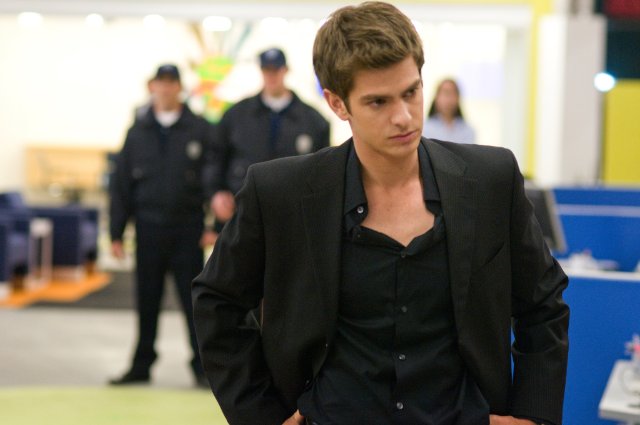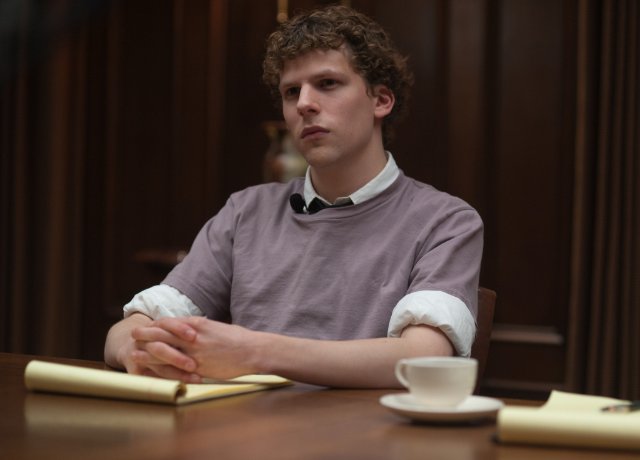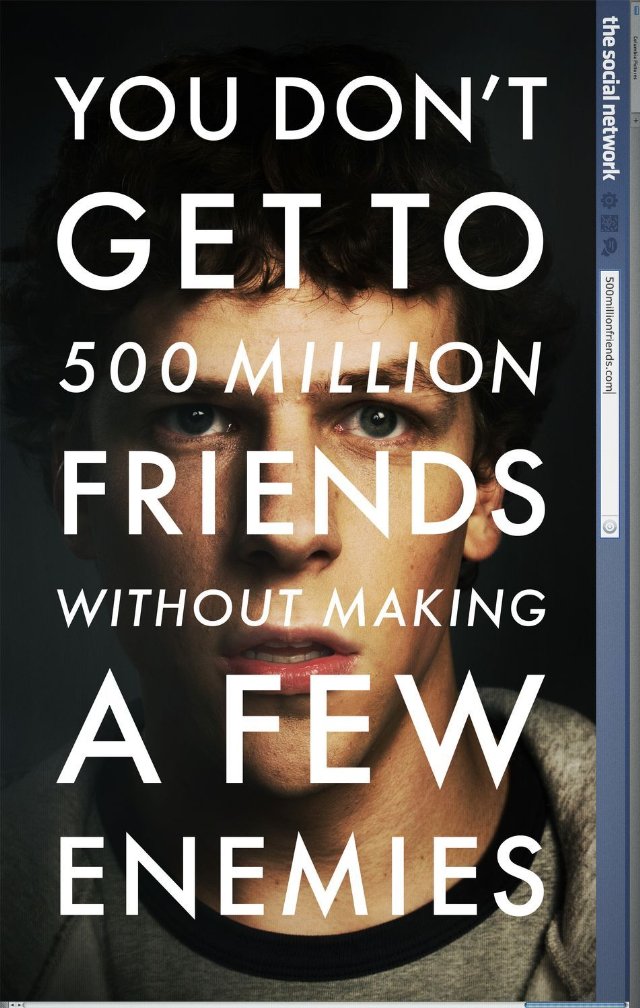Status: In theaters (opened 10/1/10)
Directed By: David Fincher
Written By: Aaron Sorkin
Cinematographer: Jeff Cronenweth
Starring: Jesse Eisenberg, Andrew Garfield, Justin Timberlake, Armie Hammer, Rashida Jones
Imagine being on the UHF program “Stanley Spadowski’s Clubhouse” and winning the opportunity to drink from the firehose, only instead of water coming out, the hose spews dialogue into your face. That’s a lot what the experience of watching The Social Network can feel like. This movie is full of words, coming at you at a mile a minute at almost all times. Jessie Eisenberg, as the onscreen personification of Facebook founder Mark Zuckerberg, does the bulk of the firehosing. He sometimes sounds like he’s rushing to spit out his lines in record time, but by the end of the film’s opening scene, you’re already used to it and totally engrossed. It takes balls to write a movie like this, and a lot of talent, too. In less-capable hands it’d come out feeling like a wordy, jumbled mess, but Aaron Sorkin is more than capable. His screenplay, which I’ve read came in at 160 pages (a typical 2-hour movie, which this is, would be more around 120), is jam-packed with dialogue spouted by fast-talking characters, and it drives the story in almost unbelievable ways.
The sniff test for me for any technology-based movie is how it deals with the specifics of its technologies, and The Social Network passes with flying colors. While Sorkin lets himself get a little carried away, particularly during a scene where Zuckerberg “interviews” interns by putting them to a hacking test while constantly feeding them shots, for the most part his characters’ dialogue is legit. We see Zuckerberg live-blog the creation of Facemash, Facebook’s predecessor, and his voice-overs describing his use of PHP, perl scripts, and wget to acquire the classmate pictures he needs from shoddily-configured Apache servers hold up. Sorkin has done his research, and it’s no surprise; you throw this much information at an audience at such a rapid pace for two solid hours, they’re going to smell it if you’re just trying to sneak stuff past them.
Based on the legitimacy of the computer-related dialogue, I have to believe that the same amount of research went into the court records that form the basis of The Social Network‘s narrative. The story is told from the perspective of two separate depositions, involving the two major lawsuits that were brought against Zuckerberg after Facebook started to take off.  The first comes from his best (and only) friend, Facebook co-founder and original CFO Eduardo Saverin (Andrew Garfield). The second is from Tyler and Cameron Winklevoss (Armie Hammer’s face on both twins, with Josh Pence providing Tyler’s body). The “Winklevi,” as Zuckerberg refers to them, had devised a website called Harvard Connection (later ConnectU) and hired him to provide programming assistance. They claim that he stole their idea and cut them out of the loop when he launched his own website. Saverin, on the other hand, claims he was unfairly squeezed out of his ownership position in the company—it was his initial $1000 investment that got it off the ground.
The first comes from his best (and only) friend, Facebook co-founder and original CFO Eduardo Saverin (Andrew Garfield). The second is from Tyler and Cameron Winklevoss (Armie Hammer’s face on both twins, with Josh Pence providing Tyler’s body). The “Winklevi,” as Zuckerberg refers to them, had devised a website called Harvard Connection (later ConnectU) and hired him to provide programming assistance. They claim that he stole their idea and cut them out of the loop when he launched his own website. Saverin, on the other hand, claims he was unfairly squeezed out of his ownership position in the company—it was his initial $1000 investment that got it off the ground.
From the retrospective view of these depositions, we get three versions of the story: Saverin’s, the Winklevoss’s, and Zuckerberg’s own account. The Rashomon style of storytelling Sorkin employs works well for two reasons. First, it gives a natural excuse to jump around in the story, to skip to the interesting parts of Facebook’s tumultuous early years. Second, it provides a clever way to avoid any claims of libel or of fabricating details; in getting three different points of view on the events, things are left just ambiguous enough to avoid being slanderous.
 That’s a good thing, because The Social Network doesn’t exactly paint a pretty picture, particularly of Zuckerberg. It does, however, give him a fair shake; he’s depicted as an insanely driven kid who happens to have a knack for knowing what people want out of the new online experience he’s trying to create. But like most stereotypical computer geeks, he lacks in social skills, to the point of ignoring the desires or feelings of anybody else he’s involved with. He’s smart, that’s clear, though I’m not sure why he’s always referred to as a “programming genius”—Facebook is the most standard, typical, and simple website you could make, technology-wise. But that’s not where Zuckerberg’s genius lies; it’s not how he does it that’s impressive, it’s the instinct he has for what to create that makes Facebook an instant success.
That’s a good thing, because The Social Network doesn’t exactly paint a pretty picture, particularly of Zuckerberg. It does, however, give him a fair shake; he’s depicted as an insanely driven kid who happens to have a knack for knowing what people want out of the new online experience he’s trying to create. But like most stereotypical computer geeks, he lacks in social skills, to the point of ignoring the desires or feelings of anybody else he’s involved with. He’s smart, that’s clear, though I’m not sure why he’s always referred to as a “programming genius”—Facebook is the most standard, typical, and simple website you could make, technology-wise. But that’s not where Zuckerberg’s genius lies; it’s not how he does it that’s impressive, it’s the instinct he has for what to create that makes Facebook an instant success.
What the movie really boils down to is a story about ego and greed. When Zuckerberg meets Sean Parker (Justin Timberlake), one of the founders of Napster, he adopts the angst-filled party-boy’s worldview, happy to give venture capitalists the finger (literally) because he knows that they need him more than the other way around, and he revels in flaunting his newfound status. He turns his back on his friend not out of spite, but out of ambition, and the way Sorkin’s screenplay handles the relationship between Zuckerberg and Saverin—showing both perspectives, eliminating any questions of malice—is more measured than the version in Ben Mezrich’s book The Accidental Billionaires—the film’s primary source—which is told a bit more subjectively from Eduardo Saverin’s point of view.
There are two things that I found really refreshing about The Social Network. For one, although it’s a big-budget movie (and surely an awards-season contender), it doesn’t feel like a typical “tentpole” release. David Fincher’s direction is elegant and classy; the performances are highly characterized, but none feel over-exaggerated; there are great special effects, but you’d never realize it from watching the movie; even the score, by Trent Reznor, appropriately sets the pace and tone without drawing unnecessary attention to itself.
The other thing, the thing I really liked, is how the film makes no attempts to depict Facebook as super-relevant to culture in general, or to over-state its importance. It’s telling a story about a kid who found success at a young age and let it get to his head, and it leaves things at that. Yes, the success he achieved is by coming up with something that seemingly everybody wants to use—and use a lot—but we never get any speeches about some supposed importance of the website itself. It’s just the vehicle by which these characters embark on their journey. (Timberlake’s Parker does get a little carried away with the overarching cultural significance of what they’re doing, but it’s in character for him, it’s not the film itself telling us we should recognize this supposed “greatness.”) What’s amazing, and impressive, and downright enjoyable, is that The Social Network resonates more because of this. It’s a timely story, yes, but it’s one about truths of human nature that apply universally.




